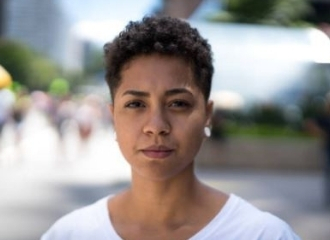Written by: Adrienne Ressler, LMSW, CEDS-S, F.iaedp
Vice President, Professional Development, The Renfrew Center Foundation
Almost everyone deals with body image issues at some point in their life. Unfortunately, most of us don’t know how to change the way we see ourselves – or know that such a thing is even possible. In this post, we review what body image is and offer tips for improving the way you see yourself.
“It is not the end of the physical body that should worry us. Rather, our concern must be to live while we’re alive – to release our inner selves from the spiritual death that comes with living behind a façade designed to conform to external definitions of who and what we are.”
– Elisabeth Kubler-Ross, Author of Death and Dying
It is ironic that the author of the book Death and Dying seems to speak so directly to individuals with body image problems—individuals who believe that their lives will miraculously be transformed once they achieve the external façade of the perfect body they so relentlessly pursue.
Unfortunately, the myth that anyone can attain their ideal body, if only they try hard enough, tends to promote low self-esteem, feelings of failure and puts us at war with our bodies. And without the tools to contextualize or change this kind of thinking, worse things – like eating disorders – can develop in their place.
What is Body Image?
Body image is a complex concept, and is woven closely together with identity issues. How you look to yourself in your mind’s eye, how you believe others perceive you and how you feel “living” in your own body all help determine who you are. Contrary to what the image-makers would like us to believe, research shows that a healthy body image is correlated, not with a physical attractiveness but, rather, with high self-esteem.
What Influences Body Image?

Promises of acceptance, popularity, health, and beauty fuel our fantasies. None of us are immune from society’s messages—we cannot escape being bombarded by a blitz of advertisements, beauty products and diet aids. By high school graduation, the average American teenager will have been exposed to over 350,000 commercials. Bodies sculpted and buffed to perfection invade our everyday lives on the pages of magazines, social media, televisions, movie screens, and even billboards on our highways.
The 35-billion-dollar diet industry fuels a mentality that plants self-doubt in even the most confident among us. As journalist, Eric Sevareid once said, “The biggest big business in America is not steel, automobiles or television, it is the manufacture, refinement and distribution of anxiety.”
How to Make Peace with Your Body
We first need to recognize that how we treat ourselves has a tremendous impact on our overall self-image and self-esteem. Many of our core beliefs and feelings about our bodies are formed by experiences we have had and the decisions we made when we were very young. No matter how much weight we may lose or how successful we may become, we tend to cling to those early images as a part of how we perceive ourselves. Experiences, emotions and sensations are stored, not only in our mind, but imprinted in the body itself—it is when we work with both brain and body that we can move through imbedded perceptions and patterns to a path of healing.
Give yourself the gift of self-acceptance! Perhaps it is not fat but diet culture, neglect and abuse of the body that is the enemy. Engage in self-care and nurturing as a way of life and listen to your body’s signals and sensations instead of what the latest diet “expert” has to say. Practice being respectful to your body for a while and notice if your body begins to be nice back to you.
Here are a few tips that can help.
9 Tips to Help You Improve Your Body Image and Treat Yourself Well
-
- NOTICE when you judge your appearance. Remember that you are so much more than a body. When you find yourself defining who you are by your physical appearance, remember that you are loved for qualities like your values, your personality and your heart. When you judge your body critically, get curious about what triggered those thoughts. Ask yourself, “If I wasn’t criticizing my body right now, what would I be thinking about instead?” There is usually a deeper emotion at play. Give your energy and attention to meaningful life goals no matter what you weigh.
- Think of yourself as your own “best friend.” Treat yourself accordingly.
- Remind yourself that the images you see in the media are totally unrealistic and unsustainable. For celebrities, filters, photoshop, buffing, sculpting, and dieting their bodies into submission is their “day” job and they have a whole support staff working for them.
- Use the mirror to appreciate, not punish, yourself. Before you look in the mirror, practice letting your eyes relax. DO NOT narrow your eyes – close them and then open them very wide several times. Feel your eyes relax. Think of “softening” your eyes and only then look at yourself in the mirror. Start with looking yourself in the eye and give yourself a friendly greeting. Next begin to widen your scope of vision to include your entire self. DO NOT focus on any one body part. Conceptualize yourself as a whole person. Do this a few times a day and remind yourself you are more than a body.
- Nurture your relationships with people who love and appreciate who you are – not because you have met certain conditions to be worthy of their approval or love. At the same time, when possible, reduce your interactions with family members or acquaintances who are negative or critical of you. You DO have some control over your environment.
- Set appropriate boundaries with people who comment on your weight or your body. Letting others know that you feel hurt by their assessment or that they are violating your personal boundaries is not only okay, but NECESSARY for your survival. Imagine that you have an invisible line around you. Inside the perimeter are all your good feelings. Decide not to let anything critical or demeaning inside of that boundary and stick to it.
- Learn to please yourself. No one can please everyone all the time so stop trying.
- Give up whatever fantasy you have about how your life will be different when you just “lose enough weight,” “fit into the clothes you wore when you were 18,” “look like the models in the advertisements,” etc. Start living your life NOW. Don’t put off whatever you need to do to make yourself happy. Start living and stop fantasizing.
- Notice your breathing to mindfully stay in the present moment and add physical movement of any kind to your daily routine. Practicing mindfulness centers and grounds you in your body. Physical movement also connects you to your body and provides you with a sense of aliveness, energy, and sparkle that will help you love, accept and nurture yourself.
Conclusion
The “language” of the body is our first language; non-verbal signals and sounds that communicate our needs and wants, our joys and sorrows. From birth, infants begin a relationship of discovery with their bodies—learning where their toes are, what sound brings mommy running, which teddy bear has the softest fur. The body never loses its power to inform, express and connect. The body is our friend, our ally and a critical resource for recovery. Start getting acquainted with your body now – it may take a while but stay with it.
You will be glad you did.






